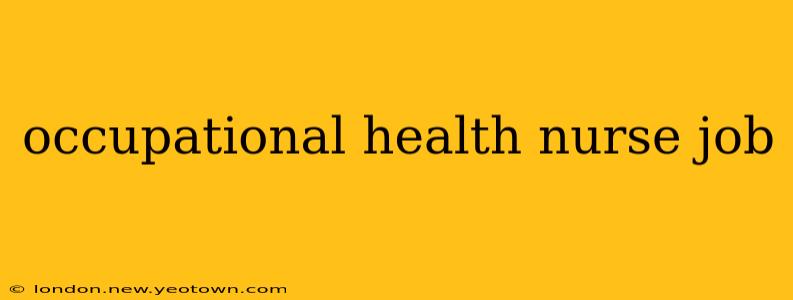The aroma of freshly brewed coffee filled the air as Sarah, a seasoned occupational health nurse, arrived at the bustling manufacturing plant. Her day, like any other, promised a unique blend of challenges and rewards, a hallmark of this dynamic and vital profession. It's not just about band-aids and blood pressure checks; it’s about proactively safeguarding the well-being of an entire workforce. Let's delve into what a typical day might hold for an occupational health nurse.
What Does an Occupational Health Nurse Do?
This isn't your average nursing role. Occupational health nurses (OHNs) are specialized healthcare professionals who work within companies and organizations, focusing on the health and safety of employees. Think of them as the frontline defenders of workplace well-being. Their responsibilities extend far beyond treating minor injuries; they're involved in designing and implementing comprehensive health and safety programs, conducting health screenings, providing health education, and much more. It’s a role demanding a blend of clinical expertise, organizational skills, and a genuine passion for improving people's lives.
What are the Main Responsibilities of an Occupational Health Nurse?
Sarah's day began with reviewing the schedule. Today, it included pre-employment physicals, administering flu shots, and responding to employee health concerns. Pre-employment physicals, a crucial aspect of her role, ensure candidates are physically fit for the job. This involves assessing physical capabilities, reviewing medical history, and ensuring they can safely perform the required tasks.
What are the typical duties of an occupational health nurse?
This question encompasses a wide range of tasks, demonstrating the diverse nature of the role:
- Health Assessments and Screenings: From basic blood pressure checks and vision tests to more specialized screenings depending on the workplace (e.g., hearing tests in a factory environment), OHNs are vital in identifying potential health risks early.
- Injury and Illness Management: This involves assessing and treating workplace injuries, providing first aid, and managing workers' compensation claims. Sarah spent a significant portion of her morning tending to a minor laceration sustained by a worker on the assembly line.
- Health Promotion and Education: OHNs are key in promoting healthy work habits. Sarah led a short session on ergonomic practices, demonstrating proper lifting techniques to prevent back injuries. This proactive approach is a cornerstone of preventing workplace accidents.
- Developing and Implementing Health and Safety Programs: OHNs play a crucial role in creating and enforcing safety protocols, often working alongside safety managers to identify and mitigate risks within the workplace.
- Case Management: They track employee health data, manage workers' compensation cases, and coordinate care with other healthcare providers as needed.
- Compliance and Regulatory Affairs: Staying up-to-date on relevant OSHA (Occupational Safety and Health Administration) regulations is paramount, ensuring the workplace adheres to all necessary safety standards.
What skills are important for an occupational health nurse?
The role demands a diverse skill set:
- Clinical Skills: Proficiency in nursing procedures, administering medications, wound care, and basic emergency response.
- Communication Skills: Excellent communication skills are essential for effectively interacting with employees, management, and other healthcare providers. Sarah effortlessly explained the importance of the flu vaccine to a hesitant employee.
- Problem-solving Skills: OHNs constantly analyze situations, identify risks, and develop solutions to ensure workplace safety.
- Organizational Skills: Managing multiple tasks, prioritizing effectively, and maintaining meticulous records are critical.
- Knowledge of Occupational Health Regulations: Staying updated on relevant laws and standards is vital for ensuring compliance.
What is the work environment like for an occupational health nurse?
The work environment is typically fast-paced, with varying levels of independence. Sarah enjoyed the blend of independent work, such as reviewing employee health records, and collaborative efforts, such as participating in safety committee meetings. The environment often changes depending on the industry, ranging from manufacturing plants to offices and healthcare facilities.
How much does an occupational health nurse make?
Salaries vary depending on location, experience, and the specific employer. However, this is a rewarding career with competitive compensation and strong job security.
As Sarah concluded her day, she felt a profound sense of fulfillment. She'd not only treated injuries and administered vaccines, but she'd also contributed to a safer and healthier work environment. Being an occupational health nurse is more than a job; it’s a calling to protect and improve the well-being of others in their workplace. It's a role that demands skill, compassion, and a genuine commitment to making a difference—one employee at a time.

